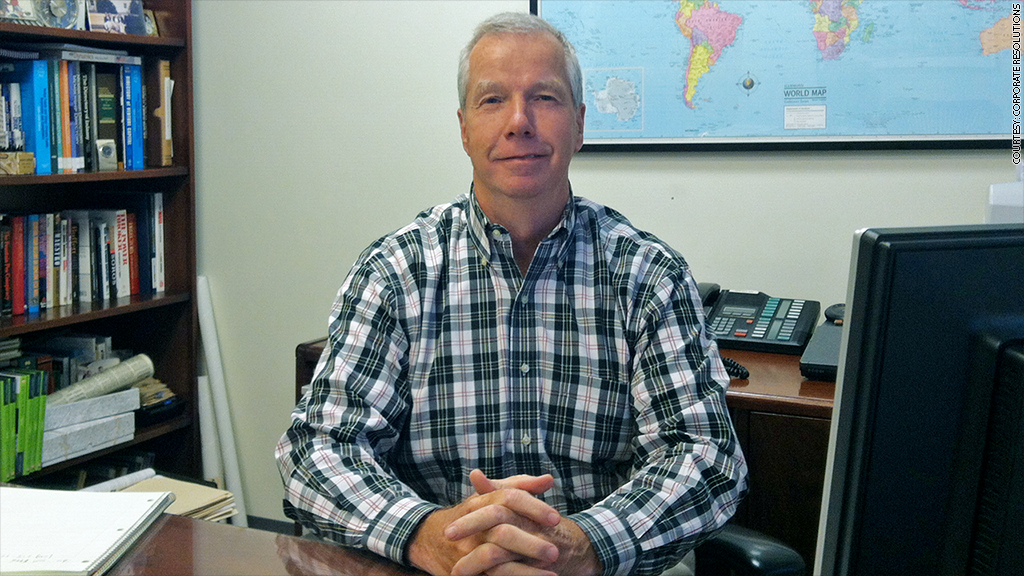
When hedge funds and pensions are looking for dirty laundry, they often call people like Ken Springer.
The former FBI agent runs a firm that sophisticated investors hire to conduct background investigations on companies they want to invest in.
Sometimes Springer's research reveals the secrets of company founders -- like allegations of fraud or even felonies -- that causes investors to walk away from a deal.
"We're the people who do the due diligence: Are they who they say they are?" said Springer, founder and president of New York-based Corporate Resolutions.
Springer, 60, believes one of the biggest problems in the financial world is that too many big investors, pension funds and venture capital firms simply don't know who they are betting on.
He's got plenty of stories to back up his case.
Too toxic: One private equity firm was shocked by what Springer discovered when he dug into the background of a mobile startup in Argentina.
The company's founder told investors he received startup financing from wealthy family members involved in banking. However, Springer's investigation revealed the founder was actually being financed by a drug cartel.
Related: Former James Bond now a financial advisor
Some members of the private equity firm were "upset" with the findings, Springer said, because it made them realize the founder was too "toxic" to invest in. "But their compliance people were ecstatic," he said.
The story highlights the risk that major investors face when they blindly sink money into a company.
"People have a false sense that because it's a regulated industry they don't need to check. You still need to do your homework," said Springer, who worked for the FBI between 1975 and 1987.
Related: From snow shoveler to biotech billionaire
Dirty laundry: Regulations require public companies to disclose material information in filings such as a 10-K. But Springer knows that some skeletons never get aired in these official documents.
"We've found CEOs of publicly traded companies who have filed for bankruptcy or who have been sued for fraud -- and yet it's not mentioned" in regulatory filings, he said.
Lies of omission, referred to by lawyers as "material non-disclosure," are among the biggest issues that background checks reveal.
Related: How math nerds are taking over Wall Street
Business is booming: Of course, it doesn't make sense for regular investors to go out and hire former FBI guys to investigate the companies they want to buy stock in.
Corporate Resolutions, which employs 28 people and has offices in Boston, Hong Kong, London and Miami, charges U.S. clients between $200 and $275 per hour.
Springer said the general rule is to spend about a tenth of 1% of an investment on an investigation. So that means someone investing $50,000 in a mutual fund wouldn't call his firm, but a hedge fund sinking $10 million into a startup might consider ponying up about $10,000 to do an investigation.
Sophisticated investors like hedge funds are increasingly willing to do just that.
"It's a growing trend -- and that's good. It's preventing a lot of bad deals. Our industry has flourished," Springer said.
Related: 'Brutally honest' cover letter leads to a job
Willful blindness: Corporate Resolutions is also hired by law firms to conduct internal investigations when employees are accused of fraud or other crimes.
"It's not always expensive to look into an allegation, but to ignore it can be costly," Springer said.
Despite all of the dirt he's uncovered, Springer believes Wall Street has cleaned itself up over the past 20 years.
"Way before Dodd-Frank was even started, I think Wall Street got the message and they fixed it up themselves," he said.
Related: JPMorgan exec loves getting his hands dirty
Yet Springer does think there's room for improvement, especially among hedge funds.
Hundreds of corporations and private equity firms have bought his firm's whistleblower hotline service, which costs $1,800 a year and allows employees to report trouble like unethical behavior or fraud.
But no hedge funds have bought the service during the eight years Springer has been selling it. That's despite the fact that these anonymous tips are forwarded to outside counsel, not regulators.
"A lot of hedge funds don't want to air their laundry. But willful blindness doesn't work anymore," he said.


